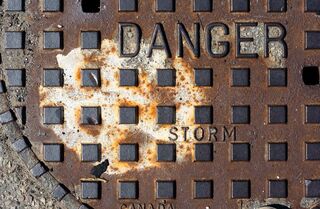Alcoholism
Circling the Drain
With excessive alcohol use, even simple tasks can feel impossible.
Posted December 22, 2020

Note from the author: In this excerpt from our book, The Craving Brain: Science, Spirituality, and the Road to Recovery, my coauthor James B. shares a haunting story from the end stage of his addiction, when it seemed only alcohol could save him from the anguish of his deteriorating brain function. —Anderson Spickard, Jr., MD
Think. You can do it. It’s not rocket science. You were a math Olympian in high school. You’re good at numbers. This can’t be happening.
The last customer had left the restaurant where I had been working since losing a highly regarded internship and leaving college. Now I was sitting in the company’s basement office, trying to balance the books. The math should have been easy—especially for a guy who started out to be an engineer. But my mind was foggy, and I was struggling to do simple addition. No matter how many times I counted, I was $500 short.
Not to worry. I had always been good at solving problems, the more complicated the better. With another drink to calm my nerves and clear my head, I’d figure it out. There were some girls at the bar next door whom I had promised to meet up with, and I could finish my work later.
The girls were a no-show, so I kicked back 5 shots in 30 minutes and decided to keep going. Somewhere around 2:30 a.m. I realized the bartenders were glaring at me. They wanted to go home. The books still needed balancing, and I stumbled back to the office. I still couldn’t figure out the problem, and so for the price of a beer, I bribed a friend to come help me.
Two hours later, we were still looking for the missing money. The more confused and frustrated I became, the more I drank. We never did find the money, because I had accidentally doubled the amount I put in our backup safe.
To make matters worse, when I finally left work, in my disoriented state I unintentionally walked out the door with the day’s receipts in my pocket—more than $2,000. When the general manager arrived the next morning, she found pints and shot glasses scattered around the office, but no money. Her angry phone call woke me up from a coma-like sleep. I had no idea what she was talking about until I saw a wad of cash in my pocket.
Racing back to the restaurant, I apologized profusely. The manager believed my mistake was unintentional, but she still took my keys and escorted me to the door. “I hope you stop throwing your life away,” she said sadly.
My body felt weak with shock. For reasons I couldn’t understand, I had lost yet another job. The unfairness of it all was too much. Yes, there were a few mental mistakes, but the manager should have cut me some slack. Why did I always have bad luck? And why was I feeling so confused? The more I tried to think it through, the crazier I felt.
For a moment, I wondered if I was losing my mind. Ever since I had been a little kid, I had enjoyed debating issues with friends. Now I felt so mentally foggy that my thoughts were fading out in mid-sentence, and I usually forgot my point before I could make it.
Despite these worries, it never occurred to me that I was wrecking my own brain. I couldn’t grasp the cause-and-effect relationship between my drug use and the decline of my cognitive powers. Instead, I resolved to try harder, to work smarter, and be more careful.
I was circling the drain, about to go down, and I had no idea why.


